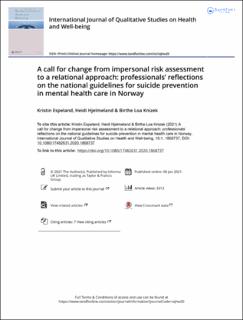| dc.contributor.author | Espeland, Kristin | |
| dc.contributor.author | Hjelmeland, Heidi Marie | |
| dc.contributor.author | Knizek, Birthe Loa | |
| dc.date.accessioned | 2022-09-20T07:15:45Z | |
| dc.date.available | 2022-09-20T07:15:45Z | |
| dc.date.created | 2021-04-21T15:53:18Z | |
| dc.date.issued | 2021 | |
| dc.identifier.citation | International Journal of Qualitative Studies on Health and Well-being. 2021, 16 (1), 1-12. | en_US |
| dc.identifier.issn | 1748-2623 | |
| dc.identifier.uri | https://hdl.handle.net/11250/3019013 | |
| dc.description.abstract | Purpose
The purpose of the study is to explore how professionals working with suicide prevention experience the influence of the national guidelines on mental healthcare, and to gather recommendations for which steps to take next.
Methods
This is a qualitative study with an explorative design. We interviewed 22 professionals responsible for implementing suicide prevention action plans and guidelines, and/or conducting relevant research. We analysed the data by means of thematic analysis.
Results
We found that the participants had an ambivalent view on risk assessment—it may be a tool, but it may also compromise other important aspects in prevention. Moreover, the possibility of liability has resulted in the need for self-protection. Instead, the participants recommended a relational approach to suicide prevention.
Conclusions
We found that the emphasis on standardized suicide risk assessment has negatively influenced suicide prevention in mental healthcare, and an approach emphasizing relational aspects is recommended. However, the prevailing objectifying concept of knowledge, the epistemological debate and the emergence of the New Public Management ideology may obstruct a fundamental emphasis on relationships. A paradigm shift in mental healthcare is called for with respect to the concept of knowledge, which forms our understandings and practices. | en_US |
| dc.language.iso | eng | en_US |
| dc.publisher | Taylor and Francis Group | en_US |
| dc.rights | Navngivelse 4.0 Internasjonal | * |
| dc.rights.uri | http://creativecommons.org/licenses/by/4.0/deed.no | * |
| dc.title | A call for change from impersonal risk assessment to a relational approach: professionals’ reflections on the national guidelines for suicide prevention in mental health care in Norway | en_US |
| dc.title.alternative | A call for change from impersonal risk assessment to a relational approach: professionals’ reflections on the national guidelines for suicide prevention in mental health care in Norway | en_US |
| dc.type | Peer reviewed | en_US |
| dc.type | Journal article | en_US |
| dc.description.version | publishedVersion | en_US |
| dc.source.pagenumber | 1-12 | en_US |
| dc.source.volume | 16 | en_US |
| dc.source.journal | International Journal of Qualitative Studies on Health and Well-being | en_US |
| dc.source.issue | 1 | en_US |
| dc.identifier.doi | 10.1080/17482631.2020.1868737 | |
| dc.identifier.cristin | 1905669 | |
| cristin.ispublished | true | |
| cristin.fulltext | original | |
| cristin.qualitycode | 1 | |

